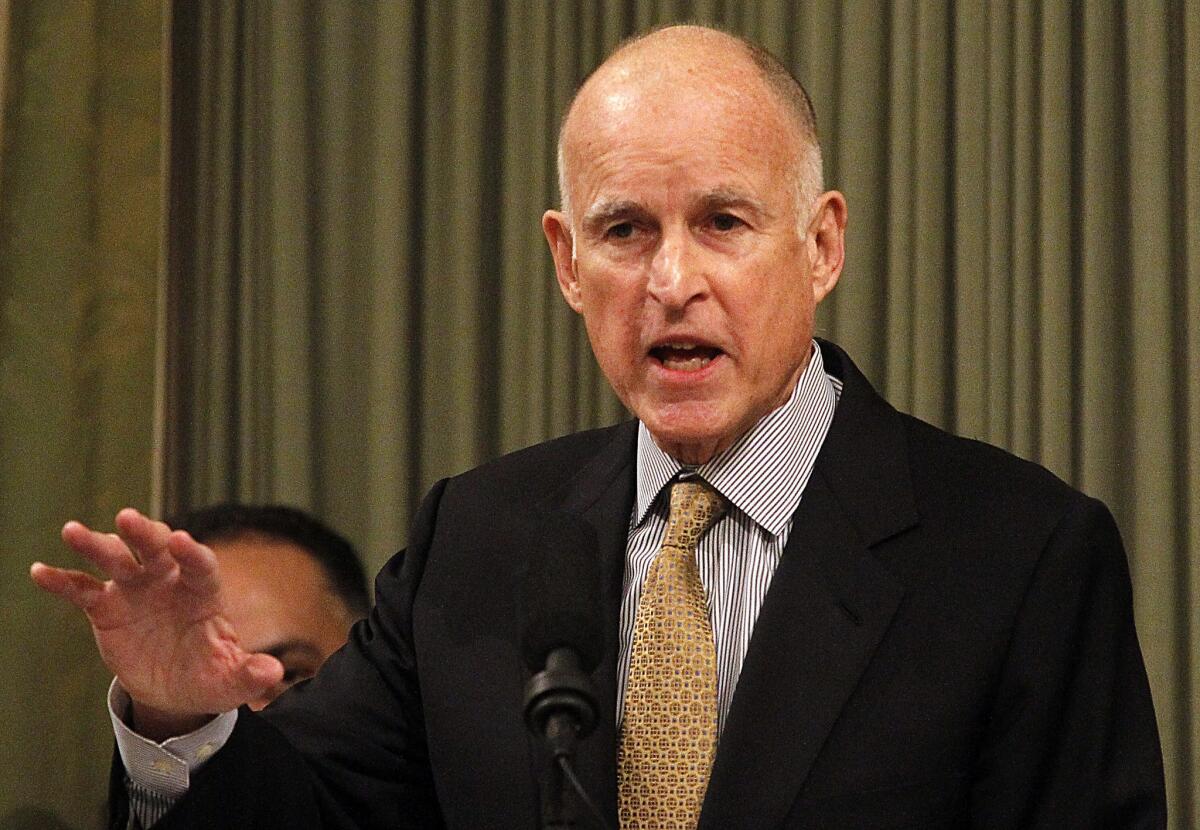Brown wants to tie some funding of universities to new proposals

- Share via
SACRAMENTO — Gov. Jerry Brown wants to tie some state funding for California’s public universities to a host of new requirements, including 10% increases in the number of transfer students from community colleges and the percentage of freshmen graduating within four years.
Brown, who has repeatedly said the universities should be leaner and serve more students, is asking for equivalent increases in several other areas as well, according to a copy of his plan obtained by The Times. Those include raising the overall number of graduates and a stipulation that more students coming from community colleges finish their studies within two years.
The document, which updates Brown’s January budget proposal for overhauling higher education, also reiterates his demand for a four-year freeze on tuition and fees for undergraduate and graduate students. If either university system hiked costs, it would forfeit $511 million in state funding — a roughly 20% increase — over the life of Brown’s plan.
The governor will release his revised spending blueprint next month. His conditions, if the Legislature approves them, could reshape the relationship between Sacramento and higher education institutions.
By meeting Brown’s goals over the next four years, the University of California and California State University systems could see their funding approach levels not reached since before the recession. But the institutions have prided themselves on their relative independence from state government, and Brown’s proposal has been greeted coldly by university officials unaccustomed to taking orders from politicians.
“We’d like to go back to the drawing board,” said Patrick Lenz, a top UC budget official. The university was not consulted in advance about the details of Brown’s proposal, he said.
Mike Uhlenkamp, a spokesman for Cal State, said it’s fine for Brown to set goals, but the details should be left up to the university.
“Do these things make sense for the university and its mission, and do we have the leeway to make decisions, are going to be part of the discussion going forward,” Uhlenkamp said.
With California’s finances stabilizing and a successful tax-hike campaign under his belt, Brown has become increasingly involved with higher education, prodding for such changes as more online classes and reduced administrative expenses.
Higher education was a central piece of his budget proposal in January, and administration personnel have been briefing legislative staff and university officials on the new details. Administration officials are scheduled to present the governor’s proposals during an Assembly hearing on Wednesday.
William G. Tierney, president of the American Educational Research Assn. and a professor at USC, praised Brown for paying more attention to higher education than any governor since his father, who held the same office five decades ago.
However, Tierney expressed concern that universities around the country are being increasingly squeezed by tight-fisted politicians.
“It seems like public institutions are being stuck with the worst of both worlds,” he said. “They’re not getting the financial support they used to… but they don’t have the autonomy that private institutions have.”
Brown’s plan would grant 5% increases to UC and CSU over the next two years, and 4% increases in the two years after that, if his conditions are met. But Lenz worries that higher costs for pensions and healthcare would eat up much of the extra money.
That would leave little for steps that could improve graduation rates, such as hiring more instructors to offer more classes and more counselors and tutors to help students plan their course work better, he said.
Cal State officials expressed concern about Brown’s focus on four-year graduation rates rather than the six-year standard they use. Uhlenkamp said it may be unrealistic for remedial students, working students who attend part time and students in demanding fields like engineering to achieve a degree in four years.
Another point of contention will be Brown’s insistence on a tuition freeze, something Republican state lawmakers have also pushed for. Although tuition has remained level for two years, it tripled over the preceding decade.
“This is about keeping tuition and fees at a reasonable level so students and their parents don’t need to suffer sticker shock,” said H.D. Palmer, a spokesman for Brown’s Department of Finance.
Both university systems are wary of agreeing to a four-year freeze. If economic problems take another bite out of tax revenue, state funding may not be able to keep pace with needs on campus, Uhlenkamp said.
Megerian reported from Sacramento and Gordon from Los Angeles. Times staff writer Carla Rivera in Los Angeles contributed to this report.
More to Read
Sign up for Essential California
The most important California stories and recommendations in your inbox every morning.
You may occasionally receive promotional content from the Los Angeles Times.















